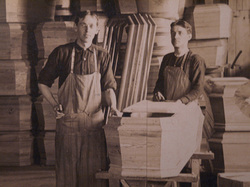



 Towards the end of The Bent Reed, my middle grade novel set in Gettysburg during the Civil War, the main character finds her father working in his carpentry shop. He is sawing planks to make coffins, using the wood from Rose's Wood Lot, a small field that stood near what became known as Devil's Den. The woodlot had been the scene of fierce fighting. Most of the trees had lost all their leaves. Many had never recovered. Pa laughs sadly and says that it is fitting for men to be buried in wood that had died the same day as they. As Pa works, others are exhuming bodies hastily buried in fields and roadsides throughout the area. A month after this scene, President Lincoln will come to dedicate a new cemetery. He gives the Gettysburg Address at that dedication.  Not every Union soldier got the benefit of being buried in a coffin. In I Married A Soldier, a memoir of Army life in the Southwest during the 1850s-1870s, Lydia Spencer Lane explains that wood was so scarce that it was customary to forgo burying coffins. She was told in Santa Fe that bodies were carried to the church in one, but removed and rolled in old blankets before being consigned to the tomb. Thus, coffins could be used and reused indefinitely. This was not acceptable to people who had been raised in the East, who did everything within their power to create coffins for their dead. Ms. Lane explains that, when there was not enough lumber at hand to make a coffin, old packing boxes and commissary boxes were brought into requisition. She recalled one officer who died at a post in Texas and was carried to his final resting place in a very rough coffin which had marked, in great black letters along the side, "200 lbs. bacon."  In Where Duty Calls, the first book in Rebels Along the Rio Grande, my trilogy set in New Mexico during the Civil War, a Confederate soldier who dies on pneumonia while on the campaign trail is buried in a coffin created from packing crates. William Kemp, the dead soldier, is an actual person, and the record of his death is part of the official records of Sibley's campaign to capture the west and its gold.  Jennifer Bohnhoff is the author of historical fiction novels for middle school readers through adults. Book two of Rebels Along the Rio Grande will be published by Artemesia Publishing in August, 2023 and is available for preorder on Bookshop.org.
5 Comments
10/5/2015 07:51:45 pm
It seems that I would like reading The Bent Reed. I like readings connected with war. My grandfather participated in WWII, and told me a lot of horrible stories
Reply
1/4/2016 12:09:31 pm
He gives the Gettysburg Address at that dedication.
Reply
1/18/2016 12:35:30 am
Isn't that a pulp fiction? I don't trust contemporary writers
Reply
1/18/2016 11:44:39 pm
Sorry for that. I just wanted to say that I understood that it wasn't a pulp fiction and I was wrong
Reply
Jossy Rascon
7/8/2023 01:22:35 am
This poignant scene captures the grim reality of the Civil War and the profound impact it had on the community. The symbolism of using wood from the battlefield to make coffins reflects the somber connection between the fallen soldiers and their final resting place. President Lincoln's Gettysburg Address, given shortly after, further highlights the significance of this historic event. <a href="https://www.theresearchguardian.com/services/thesis/engineering-thesis-writing-service/"><b>Engineering thesis writing services</b></a> can help in exploring the intricate details and themes presented in this powerful moment.
Reply
Leave a Reply. |
Don't see what you're looking for?
I am in the process of moving all my blog entries to a different blog site. Eventually, this page will go away. If you're looking for something and it's not here, try my new site, or email me and suggest I write a blog on the topic you are interested in. 
ABout Jennifer BohnhoffI am a former middle school teacher who loves travel and history, so it should come as no surprise that many of my books are middle grade historical novels set in beautiful or interesting places. But not all of them. I hope there's one title here that will speak to you personally and deeply. Categories
All
Archives
March 2025
|